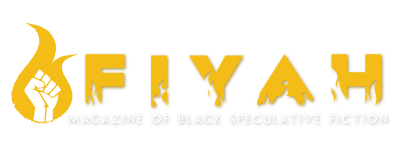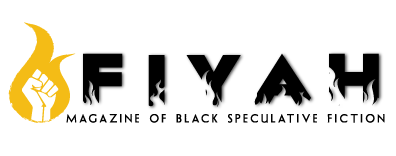
FIYAH: Welcome to our first Black History Month here at FIYAH. As part of our celebration of this illustrious time of year, we are interviewing black SFF writers from across the globe. Our second interview is with the wonderfully talented and far too humble, Nicky Drayden. We so appreciate her taking the time out to speak with us today. Let’s hop right to it!
FIYAH: When was the moment when you decided to fully pursue professional writing?
Nicky: Being a writer is ground deeply into my bones. From the moment I started my first book over fifteen years ago, I was hooked. I didn’t really focus on the professional aspect at first, since I was so busy trying to learn my craft. Last year, I finally hit my million words of prose written, and I still feel like a newbie. I’m getting paid to write now, but there’s a steep learning curve ahead of me, so it feels more like a paid internship.
FIYAH: If you could get readers to draw one thing out of your writing, what would it be?
Nicky: I’d like for readers to feel so immersed and invested in the story that they respond to the characters’ plights with a physical reaction, either laughing out loud, crying, or even swearing at a character. The power of story amazes me, and to be able to make someone have an emotional response to the little black marks I wrote on white paper feels kind of like a superpower, honestly. And I promise to use my powers for good. Mostly.
FIYAH: What do you draw inspiration from as a writer?
Nicky: I draw inspiration from the world around me—odd things that strike me as I’m going about my business, like a weird sign, a peculiar sound, or a bit of overheard conversation. Also, reading. Non-fiction in particular. It’s stranger than fiction. But mostly I have a lot of weird dreams that become story ideas. If I’m not actively working on a project, my dreams tend to get REALLY weird.
FIYAH: What was the impetus for Prey of Gods?
Nicky: Well, the first character I wrote for this book, a disenfranchised demigoddess working as a nail tech, came to me while I was driving around downtown Houston and saw a salon sign that said “Magic Nails.” I thought about how cool it would be if they really did use magic to do nails, but then started thinking what kind of person would be giving manicures if they could do magic. I wrote a character sketch and filed it away.
I like to participate in National Novel Writing Month, and in 2009 when November 1st rolled around and I was desperate for a story idea, I turned to my pile of random character sketches, picked a handful of them, and decided to weave them together into a story. I chose to set the story in a futuristic South Africa since I’d been there back when I was in college, and I thought it’d be interesting to project how the experiences I had there would look fifty years from now.
FIYAH: Do you find short stories or novels better suited to your writing tastes?
Nicky: I started off writing novels, and feel more comfortable having a great expanse of space to explore my ideas, my characters, and myself. I enjoy flash fiction, too, because I like the challenge of telling a story in a confined space, making every word work double or triple time. But short stories are HARD for me, and I still strike out on them more than I hit.
FIYAH: Seeing as how you do Nanowrimo, what do you feel are the advantages and disadvantages of the event?
Nicky: Obviously, NaNoWriMo is not an event meant for everyone, but if you’re encouraged by challenges and deadlines, it could be the kick in the pants you need to get that novel written that’s been sitting in the back of your mind for years. The biggest advantage is that it forces you to quiet your inner editor and just write. There’s no time to concentrate on writing beautiful prose, agonizing over sentence structure or word choice. It’s just getting story on paper. It might be a story that can be salvaged and turned into something great. It might be destined to see the inside of a trunk for all eternity. Who cares? It’s the act of creativity that matters.
One disadvantage is that it might discourage people from writing if they fail to meet their goal, or it might force someone to write in a way that doesn’t complement their natural process. If NaNoWriMo doesn’t work for you, just let it go. Try something else. And even if you only get 20,000 words done by the end of the month, celebrate because it’s 20,000 more words than you had at the beginning of the month.
FIYAH: How important do you feel it is for black authors to bring their blackness onto the page?
Nicky: It’s important that black authors have the freedom to pour themselves onto the page, but it’s even more important that we ensure the blackness stays on the page. As writers, we all have to develop a thick skin and learn to accept critique, but the skin has to be doubly thick for black authors. It’s one thing for someone to point out a gaping hole in your plot, and a completely different thing to be told that your experience is irrelevant because it doesn’t speak to a broader market, but maybe if you whitewashed this character…
It takes quite a while to hone your craft, and it’s all but impossible to do so in a vacuum, so most young black writers will come up against well-meaning critiquers and editors who can do real damage to a manuscript, or worse, to the writer’s sensibilities. How do we combat this? More black editors in publishing for one, but also through education and mentorships, and being open to discussing the gamut of human experiences in writing workshops, so that we can all offer better feedback on stories that might not speak directly to our personal experiences.
FIYAH: For those in that stage of still learning their craft, what lessons would you impart on them?
Nicky: Guard your writing time. Guard your writing style and writerly sensibilities. Guard the vision for your story when accepting feedback. Your story might not always make sense to others, but that doesn’t mean that what you’re doing is wrong. It might be that your craft isn’t fully developed yet, and you need more experience to pull it off. So write more, read more, keep challenging yourself to grow as a writer and a person.
FIYAH: Five years from now and in a perfect world, where would you like to see your writing career?
Nicky: I’d love to have five books published, and a dedicated fan base who enjoy the weird stuff that I write. I’d like the odd bit of fan mail telling me how my novel made someone squirt root beer out of their nose. Throw in a couple awards, maybe a Guest of Honor spot at some conventions. I’d like to teach some, too, and help build the writing community, working to make it more inclusive. Financially, I’d love to be able to turn my den into a luxurious pillow room, and replace my dining table with a giant ball pit.
FIYAH: What nonfiction books are you currently delving into and what have been some of your favorite ones overall?
Nicky: I just finished Sapiens: A Brief History of Humankind by Yuval Noah Harari, and found it very engaging. What I took away from it is that it is Story, and not opposable thumbs, that sets us apart from the rest of the animal world. Our ability to believe in common ideologies carved the way for us to live in larger social groups. These stories were so ingrained in us that we were (and are) willing to fight and die for them. It doesn’t matter if the story is true or not, it still affects us deeply, and there is no amount of logic that will sway us away from our core beliefs. Whether this is a design flaw in humanity or a feature, it’s probably still too early to say.
I also recently read Rise of the Robots by Martin Ford. Reality is quickly catching up to science fiction, and this book helped me to visualize the social impacts robotics will have on our society in the near future. Obviously there are factory and service jobs we’ve known automation was going to wipe out for quite some time, but how about art and entertainment? If a A.I. can write 35 novels in a minute and a half, where does that leave someone like me who’s doing well to write one per year? Will science fiction even be a genre fifty years from now, or will it all be shelved in general fiction? Story is something that we humans can’t separate ourselves from, so in that regard, maybe there will always be some sort of market for human written stories, probably for the nostalgia factor. At least I hope so.


